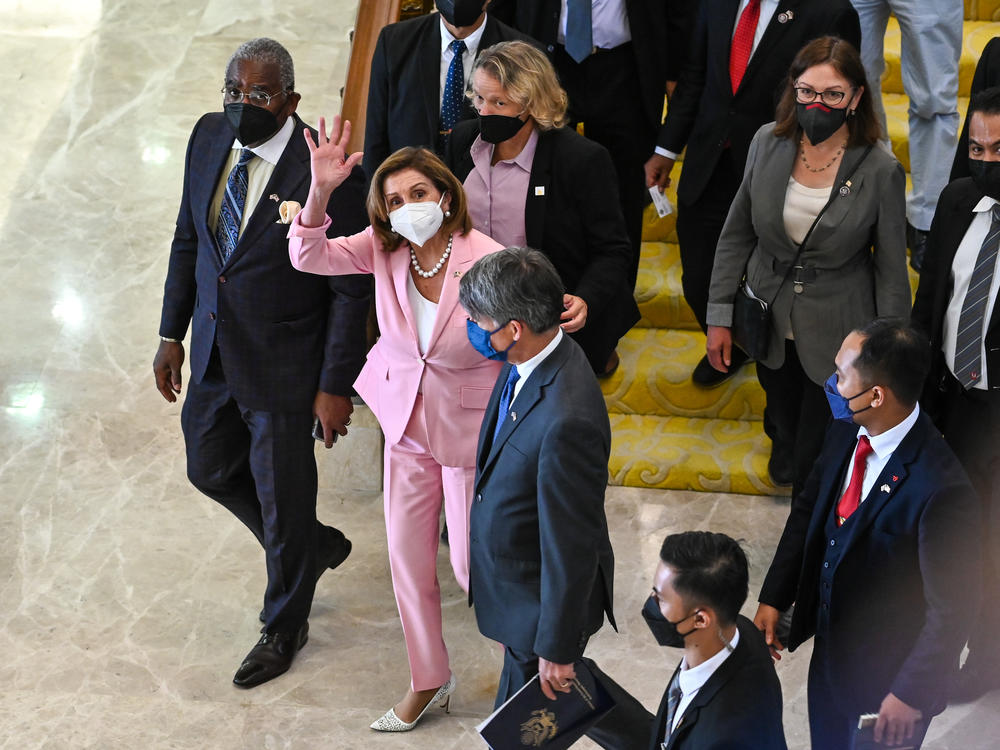Section Branding
Header Content
Pelosi arrives in Malaysia as tensions rise over possible Taiwan visit
Primary Content
KUALA LUMPUR, Malaysia — U.S. House Speaker Nancy Pelosi arrived in Malaysia on Tuesday for the second leg of an Asian tour that has been overshadowed by an expected stop in Taiwan, which would escalate tensions with Beijing that claims the self-ruled island as its own territory.
The plane carrying Pelosi and her delegation touched down at an air force base amid tight security. She called on lower house Speaker Azhar Azizan Harun in Parliament and adjourned for a luncheon meet with Prime Minister Ismail Sabri Yaakob.
While there have been no official announcements, local media in Taiwan reported that Pelosi will arrive in Taipei on Tuesday night, becoming the highest-ranking elected U.S. official to visit in more than 25 years. The United Daily News, Liberty Times and China Times — Taiwan's three largest national newspapers — cited unidentified sources as saying she would fly to Taipei and spend the night after visiting Malaysia.
China, which regards Taiwan as a renegade province to be annexed by force if necessary, has warned of repercussions, saying its military will "never sit idly by" if Pelosi pushes ahead with the visit. China's threats of retaliation have driven concerns of a new crisis in the Taiwan Strait, which separates the two sides, that could roil global markets and supply chains.
The White House on Monday decried Beijing's rhetoric, saying the U.S. has no interest in deepening tensions with China and "will not take the bait or engage in saber rattling."
White House National Security Council spokesperson John Kirby underscored that the decision on whether to visit the self-ruled island was ultimately Pelosi's. He noted that members of Congress have routinely visited Taiwan over the years.
Kirby said administration officials are concerned that Beijing could use the visit as an excuse to take provocative retaliatory steps, including military action such as firing missiles in the Taiwan Strait or around Taiwan, or flying sorties into the island's airspace and carrying out large-scale naval exercises in the strait.
"Put simply, there is no reason for Beijing to turn a potential visit consistent with long-standing U.S. policy into some sort of crisis or use it as a pretext to increase aggressive military activity in or around the Taiwan Strait," Kirby said.
U.S. Secretary of State Antony Blinken also urged China to "act responsibly" in the event that Pelosi proceeds with the visit.
"If the speaker does decide to visit, and China tries to create some kind of a crisis or otherwise escalate tensions, that would be entirely on Beijing," he told reporters at U.N. headquarters in New York. "We are looking for them, in the event she decides to visit, to act responsibly and not to engage in any escalation going forward."
Taiwan and China split in 1949 after the Communists won a civil war on the mainland. The U.S. maintains informal relations and defense ties with Taiwan even as it recognizes Beijing as the government of China.
Beijing sees official American contact with Taiwan as encouragement to make the island's decades-old de facto independence permanent, a step U.S. leaders say they don't support. Pelosi, head of one of three branches of the U.S. government, would be the highest-ranking elected American official to visit Taiwan since then-Speaker Newt Gingrich in 1997.
Pelosi kicked off her Asian tour in Singapore on Monday but her purported visit to Taiwan has sparked jitters in the region.
Singapore Prime Minister Lee Hsien Loong "highlighted the importance of stable U.S.-China relations for regional peace and security" during talks with Pelosi, the city-state's foreign ministry said. This was echoed by Japan's Foreign Minister Yoshimasa Hayashi in Tokyo, who said stable ties between the two rival powers "are extremely important for the international community as well."
The Philippines urged U.S. and China to be "responsible actors" in the region. "It is important for the U.S. and China to ensure continuing communication to avoid any miscalculation and further escalation of tensions," said Foreign Affairs spokesperson Teresita Daza.
China has been steadily ratcheting up diplomatic and military pressure on Taiwan. China cut off all contact with Taiwan's government in 2016 after President Tsai Ing-wen refused to endorse its claim that the island and mainland together make up a single Chinese nation, with the Communist regime in Beijing being the sole legitimate government.
On Thursday, Pelosi is to meet with South Korean National Assembly Speaker Kim Jin Pyo in Seoul for talks on security in the Indo-Pacific region, economic cooperation and the climate crisis, according to Kim's office. Pelosi is also due to visit Japan, but it is unclear when she heading there.
Copyright 2022 NPR. To see more, visit https://www.npr.org.

